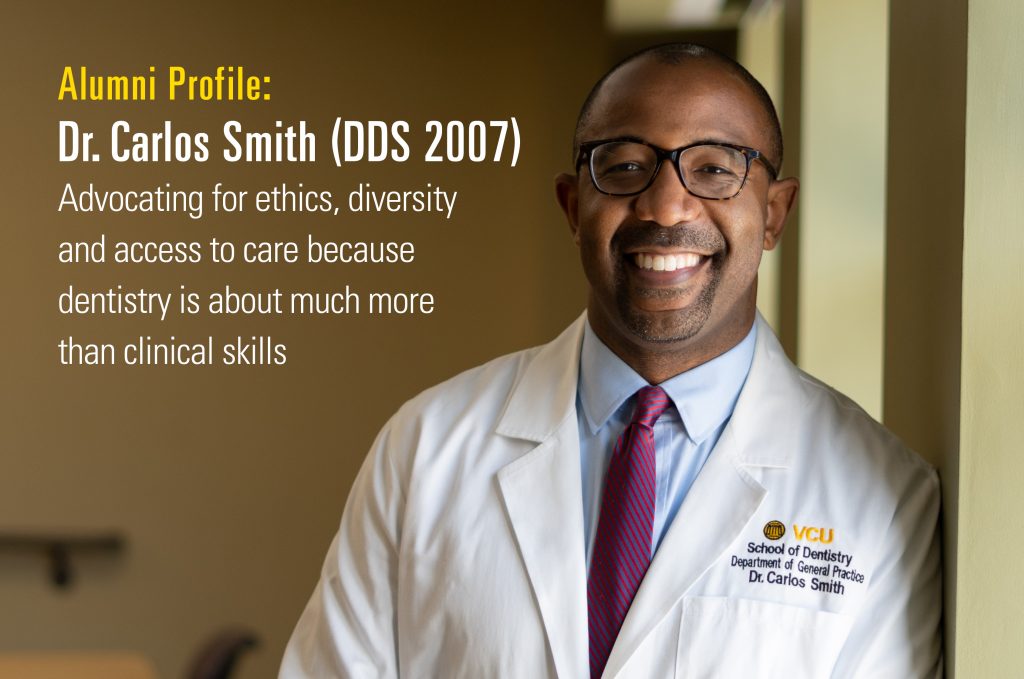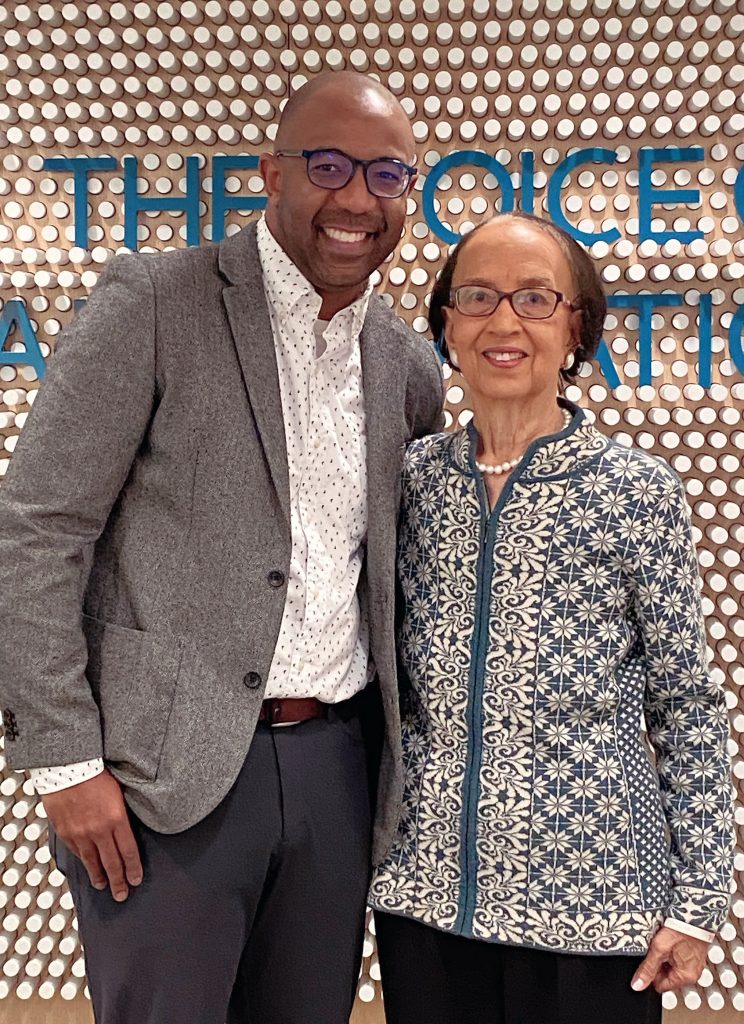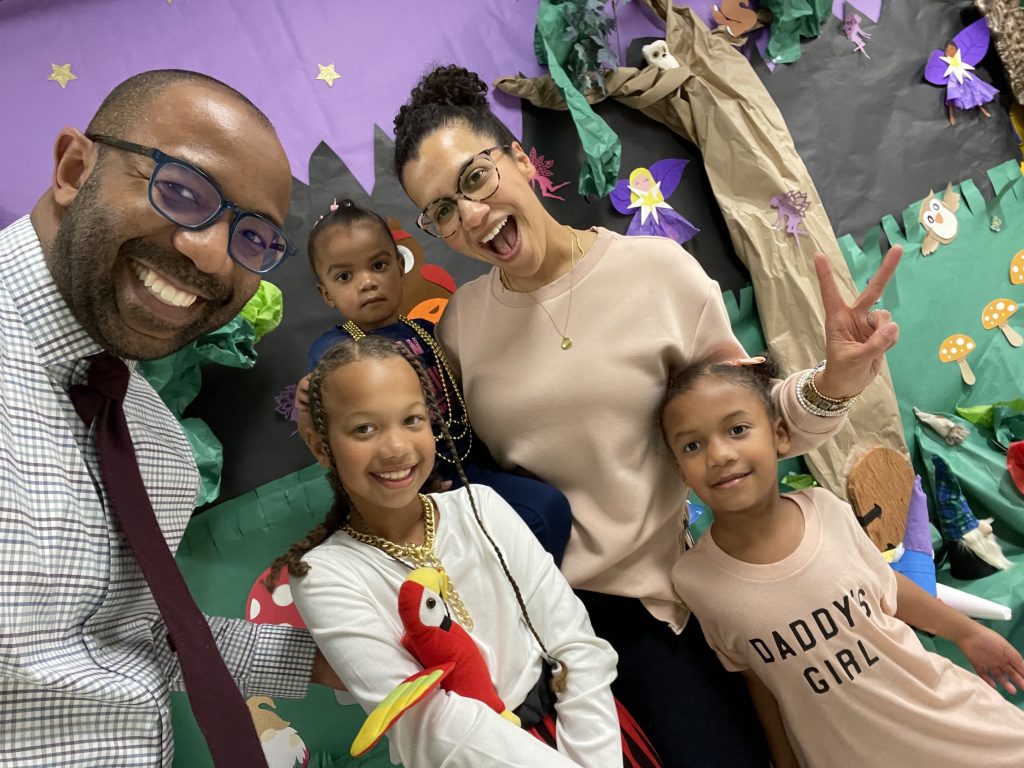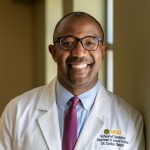Alumni Profile: Dr. Carlos Smith (DDS 2007) – Advocating for ethics, diversity and access to care because dentistry is about much more than clinical skills15 min read

Carlos Smith is the rare dentist who holds both a DDS degree and a Master of Divinity Degree.
The combination of those interests has led Smith to a successful career in academia as a faculty member and Associate Dean at the School of Dentistry at Virginia Commonwealth University (VCU). In the process, he has gained national standing for his expertise in ethics, professionalism and diversity in both dental education and the practice of dentistry.
Smith has published extensively on various aspects of health equity and access to care, along with ethical considerations for those in the dental profession. He is a frequent presenter on those topics at conferences of state, national and international dentistry organizations.
Last year, Smith received the inaugural Dr. Jeanne C. Sinkford Faculty Leadership Award from the American Dental Education Association (ADEA). Among his many current and past national leadership positions, Smith is president-elect of the American Society for Dental Ethics, serves as the only dentist on CVS Health’s National Health Equity Advisory Board, and is a member of the board of directors of the Academy for Professionalism in Healthcare, a national organization committed to ensuring professionalism across health profession disciplines.
After graduating from the University of Michigan School of Dentistry in 2007, Smith spent several years in public health and private practice in North Carolina, while also earning his Master of Divinity Degree from Duke University. In 2015, he joined the dentistry faculty at VCU in Richmond as an assistant professor. His clinical teaching in the Department of General Practice was complemented by directing the Ethics Curriculum and teaching an introductory course on Ethics, Professionalism and Ethical Decision-Making. Smith served as a Group Practice Leader from 2017-20, managing the student clinical experience and the various requirements of its operations.
In 2021, Smith was promoted to Associate Professor in the Department of Dental Public Health and Policy, with responsibility for directing courses on diversity, inclusion, ethics and professionalism. He facilitated the creation of a certificate program in Public Oral Health that covered dental public health, oral health integration, healthcare ethics, advocacy and wellbeing of the oral healthcare workforce.
Smith was appointed Director of Diversity, Equity and Inclusion from 2020-23, then last year was named the school’s inaugural Associate Dean of Inclusive Excellence, Ethics and Community Engagement. He is responsible for leading the school’s commitment to inclusive values for all of its stakeholders – patients, students, staff and faculty – while expanding and strengthening the ties of Virginia’s only dental school to community organizations and patient groups across the state.
While still involved in clinical teaching, over time Smith has carved out a niche where he focuses on what could be called the humanities of dentistry – the ethics of the profession and its need to ensure access to care across all of society.
National accreditation standards require dental schools to teach ethics as part of their curriculum, but Smith’s pedigree sets him apart from most other faculty in that role. While completing his Master’s of Divinity studies at Duke, he earned a certificate in Clinical Pastoral Education at the Duke Medical Center, providing care and crisis management for families of cardiac pediatric patients. An ordained clergy, he has served in pastoral ministry as an associate pastor, young adults pastor and college pastor.
When it’s occasionally pointed out to him that he has unique credentials “for a dentist,” he acknowledges that his M.Div. is “a fancy sort of theological and philosophical degree.” But it is a distinction he has embraced because of his conviction that dentistry and dental care have to be much more than the technical skills of filling cavities, preparing a crown, or designing the latest veneer. The profession has broader responsibilities for improving and expanding healthcare for those patients who have historically been on the margins of society, with little or no access to dental care or other types of healthcare. Further, dental schools must bolster the recruitment of a diverse student body to better reflect the diversity of society, while at the same time building a robust curriculum emphasizing the importance of welcoming and treating patients from all walks of life.
The path to Michigan
Where Smith stands today in the realm of academic dentistry is firmly rooted in his childhood growing up in South Carolina. He learned early on about the range of socioeconomic levels in society and how environments can either hinder or expand one’s outlook on life. Hailing from a family that greatly valued education, his father, a retired educator and principal who had earned his PhD when Smith was a young boy, and his mother, a dedicated federal employee for more than 40 years, were college sweethearts at Benedict College, a Historically Black College and University (HBCU) in Columbia, S.C.
Smith chose to attend another HBCU, Hampton University in Hampton, Virginia. As he considered various professions, he was interested in dentistry but wanted to learn more about it before committing to that path. He discovered that the University of Michigan School of Dentistry had a summer enrichment program for aspiring dental students, called Profile For Success, or PFS. He was accepted into the program between his sophomore and junior years at Hampton, a year earlier than the norm, because he had already completed a requisite course in organic chemistry.
PFS was created in 1994 to increase socioeconomic and racial diversity in the pool of applicants who apply to dental schools each year. Then as now, much of the PFS schedule is spent tutoring the undergraduates in science and math coursework they will find on the Dental Admission Test when they apply to dental schools around the country. Participants also meet faculty, dental students and practicing dentists who can answer their myriad questions about the profession, dental school and treating patients.
Smith was impressed with the atmosphere he found at the school during his two months on campus. It went beyond the PFS program. The dental school’s longstanding commitment to diversity, equity and inclusion was in action decades before DEI became the common term and initiative that it is today. The school’s welcoming climate and storied history of African American graduates helped convince Smith to pursue his DDS at U-M.

“Programs like PFS are invaluable because it was my first formal introduction to dentistry and dental education,” Smith said. “It was the first time I got to hold a handpiece. It was the first time I learned some of the dental terminology and vernacular. It was my first introduction to the foundational concepts of dentistry. It opens students’ eyes to possibilities that they are not even aware of that exist when you are talking about careers. And there was a camaraderie with dental students, pre-dental students, residents and the faculty. The experience in many ways made Michigan feel like home. It set a high bar for when I interviewed at other schools. I knew what Michigan felt like. I had sat in some of the classrooms, I had been able to tour the clinics, so I had a comparison. It was an introduction to so much in a robust and healthy way.”
That dynamic of educational and inclusive excellence continued during his four years at the dental school, from 2004-07. He developed a network of friends and mentors, many of whom continue to be part of his life today. He credits faculty members at the school for helping to foster his interest in the humanistic aspects of the dental profession. Dr. Marilyn Lantz, now retired, who was Associate Dean for Academic Affairs when Smith was a student, led the development and implementation of a professional ethics curriculum component for the school. She taught the “Introduction to Dentistry” course with an emphasis on the societal responsibilities of the profession in providing and improving healthcare for all of society.
Another faculty member, Dr. Marita Inglehart, mentored some of Smith’s first research projects when he was in dental school, as did Dr. Todd Ester, now the Associate Dean for DEI. One of Smith’s early projects examined dentists’ decisions about whether to become Medicaid providers; another surveyed African American middle school students to assess strategies for recruiting minoritized students into dental careers. Inglehart, the dental school’s only faculty member from the behavioral sciences, has taught at the school since 1990. Her focus is on social determinants of health and healthcare, patient-centered outcomes, and the role of education in creating culturally aware future dentists and dental hygienists. She helped establish the dental school’s Multicultural Affairs Committee 25 years ago.
“It is no exaggeration to say that Marita, in many ways, has championed and defined Michigan’s longstanding commitment to diversity and what it means to be an ally, but she has also shaped much of the national landscape across dental education of truly inclusive learning and clinical environments. There is no PFS, or many of the programs modeled after it across the country, without the decades of research she has done to prove that diversity actually works and matters.”
Dentistry’s challenges today
The American Dental Association and ADEA have both emphasized that dentistry needs to better reflect this country’s population with its incredible diversity in terms of race, ethnicity, gender, socioeconomic status, religion, sexual orientation, disability, language and culture. It’s often called “cultural competency,” which ADEA has defined as “the awareness and ability of providers to respond to the sensibilities of patients whose cultures and values may be very different from their own.”
ADEA cites extensive studies that have shown that greater diversity in healthcare professions and their educational units provides a better experience for students and leads to improved access to care for patients. “Without minority practitioners,” ADEA has reported, “access to care will be limited or absent in minority communities throughout the nation.”
Smith has written and lectured extensively about these issues. He said he prefers the term “cultural humility” to the more common “cultural competency.”
PFS 30th Anniversary Celebration
On Thursday and Friday, June 27-28, 2024, the U-M School of Dentistry will host a celebration marking 30 years of the Profile For Success program. Symposia will address topics including the impact of diversity in dentistry and the contributions and history of PFS. Also scheduled are continuing education courses, student-alumni networking, dental school and campus tours, and social events, including a Friday evening gala at Weber’s Hotel in Ann Arbor. Speakers include Dr. Todd Ester, the school’s Associate Dean for DEI; Dr. Carlos Smith, a PFS alumnus and Associate Dean at the Virginia Commonwealth University dental school; and Dr. Kenneth Carter, a PFS and orthodontics alumnus who practices in Illinois. For more information, contact [email protected] or fill out this form to let us know that you plan to attend.
“People come from different backgrounds. People have different cultural instincts and norms. People have different lenses and perspectives that they are viewing through. And if we are going to meet the oral healthcare needs of all, which really should be our ethical and professional goal, then we need providers that look like all the different types of people we treat. Whether that’s Indigenous groups or African-Americans or all kinds of people from different rural or socioeconomic backgrounds. It’s not just race. Not all diversity is apparent visually – it can be language, culture, religion, or even issues of accessibility and neurodiversity.
“I think cultural humility is at the heart of what it means to be a dentist because of our commitment to lifelong learning. It means I am always remaining open to evolutionary changes and adapting to new understandings of how to be better, how to be more relatable, how to ensure my patient really understands what I am communicating to them, how to get the best outcomes. So I am always going to be learning. Twenty-five years ago, very few people were talking about gender pronouns, then we evolved in our understanding. In the next 25 years, we can’t even predict how we might need to evolve in our understanding of being culturally proficient, culturally responsive providers.”
Optimism for the future
Professional dentistry organizations at the state and national levels are implementing programs that work to improve the profession’s commitment to diversity. Smith notes that the state of Michigan now requires that dentists complete implicit bias training in order to maintain their professional license.
“I am a hybrid of optimist and realist,” Smith said. “Yes, we are improving, but there is so much more to do. And I think there is still a significant amount of push-back in the profession. Sometimes I have audiences where someone will say, ‘This all sounds good Dr. Smith, but I want to focus on the dentistry.’ And my response is: This is dentistry. This is the delivery of healthcare. You cannot treat your patient with dignity while ignoring their preferred pronoun. That is a part of the dentistry. That is equally important to my ability to go in and do a good 5DO restoration because I can’t do that 5DO restoration if my patient is apprehensive or scared of me. Or if their anxiety is through the roof because they think I have disrespected them or said something disparaging to them or don’t recognize their full humanity.”
It’s the same message that dental schools must continue to convey to their students, even as they also collaborate with professional dental organizations to recruit a more diverse student body to begin with. That’s yet another related issue that Smith has studied. How can the profession encourage young people to consider dentistry? Recruiting students at the high school or college undergraduate level was once considered the right timing, but Smith says students today have considerably more options for good careers in areas such as, for example, computer technology. A better strategy is reaching them in elementary school to convince them of the personal and professional rewards of dentistry, and to set them on a course for the math and science they will need to gain entrance to dental school.
“Part of the challenge is that dentistry in a silo cannot fix and address the challenges within our broader K-12 educational system,” Smith said. “We’re a piece of society. And so what we can do is work alongside those in the K-12 environment to assure that dentistry and oral healthcare are understood as a worthwhile pursuit. I think today some of the challenges we see are that there are so many careers that exist today that didn’t exist 20 years ago, which is great for students – find your passion, find your interest. But today they are pulled in so many directions. Whereas 25 years ago, it was doctor, lawyer, engineer, dentist – there were fewer categories that were considered pathways for success or upward mobility. There are so many choices now. So dentistry must really show how we are who we say we are. We are able to truly transform lives and circumstances through the smile.”
That early intervention must still be paired with programs like the Profile For Success model at U-M. Smith is grateful for what he learned and the people he met during PFS, which gave him a head start on dental school. As the program celebrates its 30th anniversary with a two-day event in June, Smith is returning as one of the keynote speakers and a proponent of the school’s effort to grow an endowment fund to support the program.
“When I think about the impact of the program, I think that anyone who participated in the program and matriculated into dental school and became a dentist, whether from Michigan or other dental schools, we have such a specific community and legacy,” Smith said. “I want to ensure, and I think all of our PFS alumni would want to ensure, that the impact of PFS doesn’t stop. We need one another to help pay it forward, whether that is financially or through networking, connections and mentoring.”
“The program can’t continue without resources, particularly at a time when diversity may not always be funded through normative higher education revenue streams. So that philanthropic support is crucial for there to be a continued and sustainable impact and legacy around what the program meant for us – and what the program continues to mean for the generations to come.”

###
The University of Michigan School of Dentistry is one of the nation’s leading dental schools engaged in oral healthcare education, research, patient care and community service. General dental care clinics and specialty clinics providing advanced treatment enable the school to offer dental services and programs to patients throughout Michigan. Classroom and clinic instruction prepare future dentists, dental specialists and dental hygienists for practice in private offices, hospitals, academia and public agencies. Research seeks to discover and apply new knowledge that can help patients worldwide. For more information about the School of Dentistry, visit us on the Web at: www.dent.umich.edu. Contact: Lynn Monson, associate director of communications, at [email protected], or (734) 615-1971.

